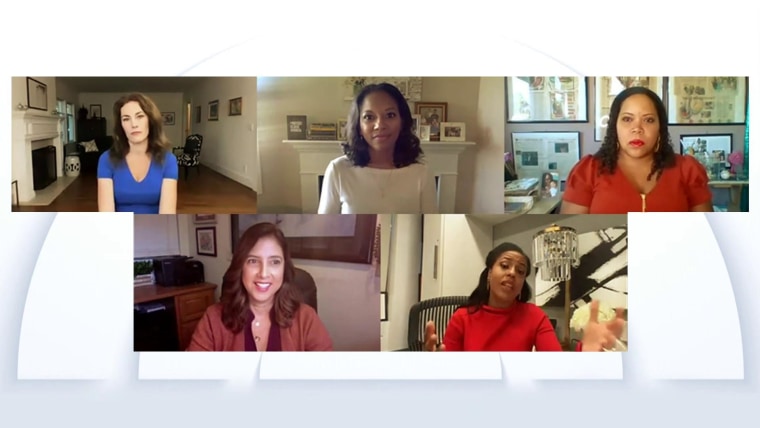Many parents have grappled with feelings of burnout during the pandemic. A new survey is putting a spotlight on a category of parents who are especially vulnerable: working moms.
The research, released Thursday by Ohio State University, found that 66% of working parents reported feeling “burned out.” Groups that were most likely to experience burnout included:
- mothers,
- parents of multiple children,
- parents of children with ADHD,
- parents who struggle with anxiety, and
- parents concerned that their kids had undiagnosed mental health disorders.
Participants in the survey made statements like, “Every day is a struggle,” “I am just so tired” and “I don’t enjoy being with my kids anymore. I need a break.”
The survey participants were 1,285 anonymous parents of children under the age of 18 who live at home. They took the university's online survey between January 19 and April 28, 2021.
“Burnout in parents is that physical, emotional over-exhaustion and that feeling of just, ‘I need a break’ — and not really knowing when you’re going to get that break,” study co-author Kate Gawlik, an associate professor of clinical nursing at The Ohio State University, told Morgan Radford on TODAY.
“I think it’s very shaming for parents to think that they can be burned out in this role of being a parent,” Gawlik added. “Obviously, we all love our kids and everything, but it’s just ... too much on us all at once to be asked to do all of these different things.”
Related: Why mothers are bearing such a huge mental load during coronavirus pandemic
According to the World Health Organization, burnout is classified as an "occupational phenomenon" rather than a medical condition. The new report focuses on “parental burnout,” which it describes as feeling exhausted, irritable, emotionally detached or overwhelmed with parenting.
The concern with burnout is that it’s unhealthy for parents. The study found an association between burnout and depression, anxiety, alcohol consumption and aggressive parenting tactics, including insulting, criticizing or physically hurting children. What's more, a parent's burnout can make it likelier that children will get distracted more easily, argue with their peers or feel sad or unhappy.
"I do feel like it’s a public health problem," Gawlik said.
Helpful tips on tough days
If you’re feeling burned out, the study authors recommend slowing down.
"There’s a lot you can do in two, three, five minutes that’s evidence-based," study co-author Dr. Bernadette Mazurek Melnyk, vice president for health promotion at The Ohio State University, told TODAY. "Take two minutes, make a hot drink, sit, sip it slowly [and] focus on the moment."
Related: Moms with kids under 5 are not OK right now
Other tips from the report include:
- Be kind to yourself. Don’t set expectations too high, overcommit or feel guilty for saying “no” to something.
- Talk to a trusted friend or family member about how you're feeling.
- Strengthen your mental resiliency and coping skills. This can include practicing mindfulness, gratitude and deep abdominal breathing.
- Ask for help. If your level of burnout is affecting your ability to function or concentrate, reach out to your doctor or seek the support of a mental health professional.
Are you burned out?
Maybe you’re feeling a little burned out these days. Is it a problem? Take this self-evaluation devised by Ohio State University researchers to find out. First, answer these 10 questions:
1
2
3
4
5
6
7
8
9
10
Scoring
For all questions except questions 4 and 10, use these point values:
Not at all = 0 points
A little = 1 point
Somewhat = 2 points
Moderately so = 3 points
Very much so = 4 points
Questions 4 and 10 use reverse scoring. Use these point values for questions 4 and 10:
Not at all = 4 points
A little = 3 points
Somewhat = 2 points
Moderately so = 1 point
Very much so = 0 points
Add all your points together for your final score.
What your score means:
0-10 points: No or few signs of burnout
11-20 points: Mild burnout
21-30 points: Moderate burnout
31+ points: Severe burnout
What should you do about it?
Score 31+: Severe burnout — Ask for help from your healthcare provider or mental health professional; connect with family members and friends. Utilize available resources.
Score 21-30: Moderate burnout — Take action! Start interventions (e.g., take time out of each day to do something for your mental health and well-being), decrease stressors, use available resources and consider asking for help. If your level of burnout is interfering with your ability to function or concentrate, seek mental health help immediately. It is a strength to recognize when help is needed, not a weakness.
Score 11-20: Mild burnout — Start preventive interventions such as taking short recovery breaks each day to do something for your mental health and well-being, decrease stressors and identify resources to help.
Score 0-10: No or few signs of burnout — you should continue to do the things you are doing and remember to prioritize good self-care.
Source: Kate Gawlik and Bernadette Mazurek Melnyk
Related:











